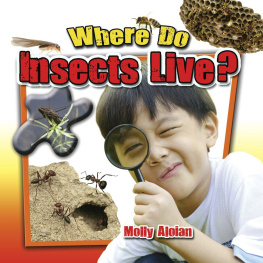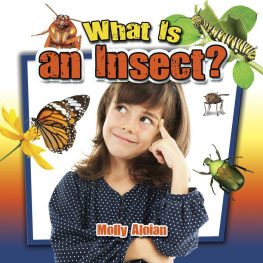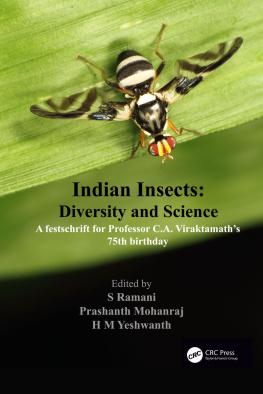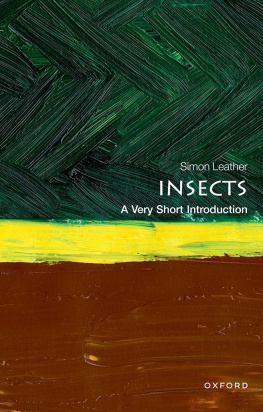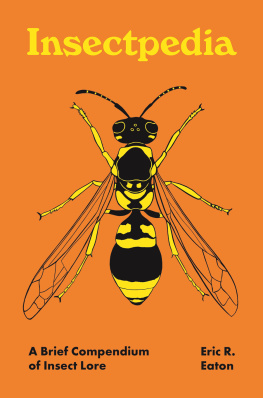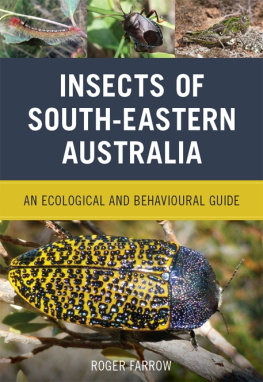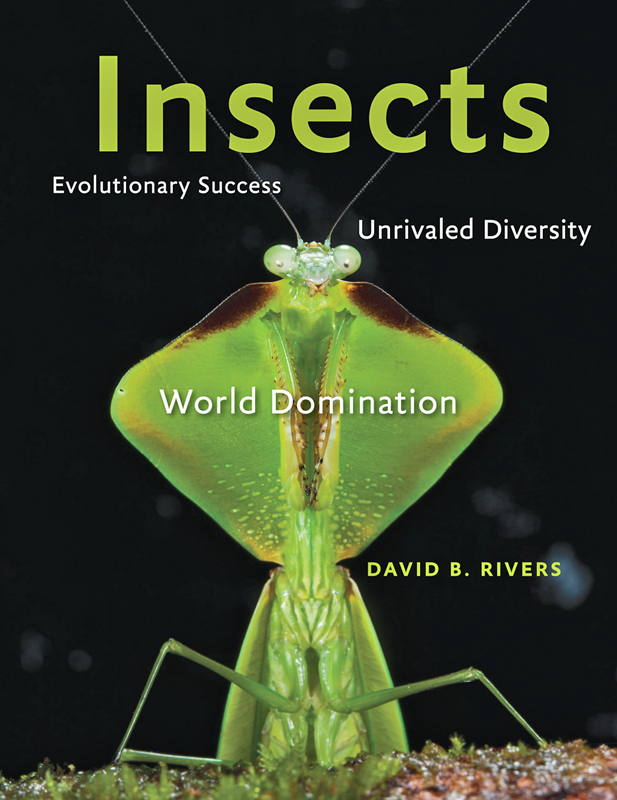Contents
Guide
Insects
Insects
Evolutionary Success, Unrivaled Diversity, and World Domination
David B. Rivers
Department of Biology
Loyola University of Maryland
Johns Hopkins University PressBaltimore
2017 Johns Hopkins University Press
All rights reserved. Published 2017
Printed in Canada on acid-free paper
9 8 7 6 5 4 3 2 1
Johns Hopkins University Press
2715 North Charles Street
Baltimore, Maryland 21218-4363
www.press.jhu.edu
Library of Congress Cataloging-in-Publication Data
Names: Rivers, David, 1966 author.
Title: Insects : evolutionary success, unrivaled diversity, and world domination / David B. Rivers.
Description: Baltimore, Maryland : Johns Hopkins University Press, 2017. | Includes bibliographical references and index.
Identifiers: LCCN 2016018627 | ISBN 9781421421704 (hardcover : alk. paper) | ISBN 1421421704 (hardcover : alk. paper) | ISBN 9781421421711 (electronic) | ISBN 1421421712 (electronic)
Subjects: LCSH: InsectsTextbooks.
Classification: LCC QL463 .R58 2017 | DDC 595.7dc23 LC record available at https://lccn.loc.gov/2016018627
A catalog record for this book is available from the British Library.
Special discounts are available for bulk purchases of this book. For more information, please contact Special Sales at 410-516-6936 or specialsales@press.jhu.edu.
Johns Hopkins University Press uses environmentally friendly book materials, including recycled text paper that is composed of at least 30 percent post-consumer waste, whenever possible.
Contents
Preface
Insects are extraordinary creatures. In every facet of biology imaginable, these six-legged life forms accomplish tasks uniquely or with an efficiency not realized by any other organisms, certainly not by any other animal. Telling evidence of their great adaptive success is their incredible biological diversity and sheer abundance on the planet. On any given day and at any moment in time, an estimated one million species or more are represented by two to ten quintillion individual insects residing on Earth. For those not scientifically inclined, and even for those who are, we call that a heck of a lot! It is nearly impossible to grasp the enormity of insects on the planet and the influence they have had (and continue to have) on life on Earth. For me, the words of Dr. Gilbert Waldbauer, in his engaging text Insects through the Seasons (1996, xiixiii), expresses all that needs to be said: Insects are endlessly fascinatingwonderful in their amazing variety and marvelous in the perfection of the evolutionary adaptations that have made them the dominant animal group on the earth. When I wake up in the morning to get ready for work, I often think about how fortunate I am to be an entomologist.
Perhaps it seems intuitively obvious that the title of this textbook was derived from Dr. Waldbauers words. A very good assumption on your part. But in actuality, his words were not the true source of inspiration for this book. That honor is bestowed on two genetically enhanced cartoon rats, Pinky and the Braincreations of Acme Laboratories by movie mogul Steven Spielbergwho starred in two self-titled animated series that aired in the United States during the 1990s. In every episode, the two rats would begin by pondering the same theme, world domination (Ponderings of Pinky and the Brain, http://yhoo.it/1ioVDvw):
BRAIN: We must prepare for tomorrow night.
PINKY: Why? What are we going to do tomorrow night?
BRAIN: The same thing we do every night, Pinkytry to take over the world!
This quote struck a chord with me as being very apropos for what insects do. Unlike the Brain, however, insects are innocent in their conquests, achieving domination of the planet with no conscious drive to do so. As acclaimed insect chemical ecologist stated so clearly in his book For Love of Insects (2003, 1), insect dominance has been achieved through an accumulation of life history successes:
Taken as a group, and viewed on a grand scale, insects have achieved a great deal. They metamorphoseor at least most of them dogrowing up as larvae and taking to the wing as adults. They have adapted for direct sperm transmittal through insemination, thereby relinquishing forever dependence on water for spawning. And as a consequence of acquisition of an exoskeletonan external skeleton consisting of a hard cuticlethey have attained quickness of motion, resistance to desiccation, and the capacity to achieve dominance on land. They have succeeded in one major respect where humans have failed. They are practitioners of sustainable development. Although they are the primary consumers of plants, they do not merely exploit them. They also pollinate them, thereby providing a secure future, both for themselves and for their plant partners.
The path laid out thus far presents insects as fascinating, efficient, responsible, and remarkably successful. These words reveal another facet of insect biology; that is, those who study insects often view the world through a much different lens than the majority of the populace, the latter often referred to as normal. When most people are polled for opinions about insects, fascination is not the first word that comes to mind. No, most use terms like repulsion, fear, disease, destruction, and many others devoid of warmth and caring for creatures with six legs. Renowned entomologist and humorist Dr. May Berenbaum summed up normal human sentiments toward insects:
The vast majority of people consider it a high priority to minimize the extent of their interaction with the insect world. Homes are sealed, sprayed, and kept meticulously clean so as to reduce the probability that they will be invaded by insects; similarly, bodies are bathed, hair is shampooed, and clothing regularly washed in order to eliminate any unwanted contact with six-legged life forms. In the overwhelmingly vast majority of daily conversations, insects are conspicuous in their absence; those rare conversations in which insects feature prominently are generally carried out in guarded tones, often with a touch of embarrassment. After all, no one likes to admit, even to close personal friends, to being stung, bitten, infested, invaded, or otherwise bested by the loathsome insects that manage to get around the safeguards.
A resounding amen was likely just breathed by the majority. I readily admit that opinions on six-legged critters are mixed. Family, friends, and most students usually do not share my enthusiasm for insects. And that is okay; the mission in writing this book was not conversion of lost souls to entomology. The book is designed for lovers and haters and anyone who falls in between. A passion for insects is not required to understand the facts, ideas, and concepts that unfold on the pages of this text. However, an open mind certainly makes learning much easier and more enjoyable. It also will allow you to see the true world of insects, no matter what view you currently hold toward such beasts.
We know that several species of insects transmit diseases and evoke huge economic losses in terms of food production and damage to buildings, as well as just annoy us to no end. But in the grand scheme of things, very few are responsible for disturbing the human condition. The overwhelming majority of insects aid our lives in some fashion, oftentimes in ways we do not realize. In Insects, I aim to discuss the good and the bad sides of insects, in an open, honest, and engaging examination of insect biology. At the end of the journey, you can decide for yourself what to think of these creatures. Personally, I find them more fascinating than any other creature I have ever encountered.


